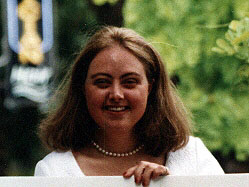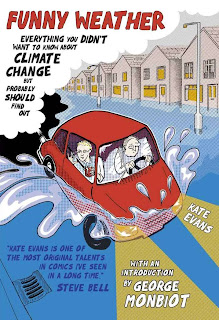Matthew and I have both independently been trying to get some understanding about what it is like to grow up with, and live with, Down Syndrome. There's a lot written from a parents perspective, but not so much by people who have DS themselves. Anyway, between us we found three articles by very different, but very wise, women - they've been through so much and we were very impressed by their determination and wisdom. I've included some excerpts here:
 Ruth Cromer
Ruth Cromer is an actor and works in a bank. She lives in Australia.
"They have always said that people with Down syndrome would not learn very much. When I was eleven, in Year 5, my teacher wrote in my school report: "We should not expect too much of Ruth". But I wanted to show people that they are wrong about me having Down syndrome. Inside me, I had the feeling that I can do things.
I strongly believe that adults with Down syndrome can have a life! People with Down syndrome need to support each other and now we have our own association. I am past President of the Future Adult Advisors. We call ourselves the "Up Club" and we are a peer support and self advocacy group. The aim of our group is to help each other and to make new friends, and to make other people aware of us. And we have over one hundred members.
What is Down syndrome for me? I do not feel any different. I know it is there, but I do not think about it. I carry on with my life. It is not going to stop me having a flat one day and getting married. I have learnt to be strong and can cope with people who are mean to me. I don’t let it worry me. I feel secure.
In a play I did, my final speech is a powerful monologue, it really hits home:
I have Down syndrome.
It’s not a disease. There is no cure.
I was born that way. I don’t like it, but I’ve learnt to cope with it.
So have my parents.
I’m not a disabled person.
I’m a person with a disability.
I’m a person first."

Eleanor Bailey was an 11 student when she wrote this article. She lives in the USA. She is now a keen basket ball player and part of
KASA (Kids as Self Advocates).
"I am 11 years old and in fourth grade. This year some little girls came to my school. I heard some people say they had Down Syndrome. On a Saturday I asked my Mom, "Do I have Down Syndrome?" Mom said that I do.
I went to my bedroom and closed the door. I didn't cry but I shut the door and was mad and upset. I didn't want to have Down Syndrome.
On Monday I went to school. I told my teacher, Mrs. Karr, that I had an announcement to make. She gave me the microphone and I said: "I have two things to say. First, I have Down Syndrome and second, I am really scared that none of you will like me anymore."
My friends were really nice. They said they already knew that and they still liked me. Some of them cried. I got lots of hugs.
But I am still not happy!
On Wednesday my Dad and I got on an airplane and went to Chicago. On the airplane I listened to my Walk Man. I have a song that goes, "Clang, clang, rattle, bing, bang, I make my noise all day." I thought that is what I can do. Even with Down Syndrome I can still make my noise.
I took lots of baths. I thought if I took enough baths I could wash my Down Syndrome away. I also thought I would put hair spray on it but my Mom and Dad won't let me have hair spray. I tried to put sun screen on it because I thought that maybe then I wouldn't have to have it all of the time. But my Dad said that none of that would work.
I got my name from Eleanor Roosevelt. Lots of bad things happened in her life. I have read all about her. She was a leader. I also know about Rosa Parks, Martin Luther King, Nelson Mandela and Robert Kennedy. Lots of bad things happened to them but they were strong and were leaders. My Dad says they made people proud of who they are and made them free.
I wish I didn't have Down Syndrome. But I do and I am a person with lots of plans.
When I wonder what to do I remember my song. I will do what it says. I will go 'clang, clang, rattle, bing, bang and make my noise all day.' Even though I am sad I know I can be as tough as anyone. That is what I want to do.
Just be me."
 Anya Souza
Anya Souza (40) lives with her partner Paul in England. She works as a stained-glass artist and is a trustee of the Down's Syndrome Association (UK).
"Back in the Sixties people didn't talk much about Down's syndrome, and amniocentesis wasn't available. Mum didn't talk to me about it as I was growing up, but later she told me that, when I was born, the doctors said I'd be mentally and physically handicapped for the rest of my life - as if I wouldn't be able to do anything for myself. But a nurse came in a few minutes later and said, "Don't listen to them, Mrs Souza. Your daughter will give you great pleasure." That part was true. Mum was always hugging me and telling me she loved me, and I know I made her proud.
People could see I had Down's syndrome because of my features. My eyes are almond-shaped, my nose is small, my feet are flat and I have tiny hands. I must have been about 17 when I looked in the mirror and thought, "Is this really me?"
But I don't remember feeling bad about myself, because I thought I looked pretty and I knew I was bright. When I read about a girl in America whose parents put her through loads of operations to change her Down's syndrome features I was horrified. They thought they were making her look "normal", but the child had no say. I'd never consider plastic surgery - I'm happy with my face. Mum encouraged me to be independent by teaching me to cook and do housework. She felt it was important to give me freedom. She believed in me so I believed in me.
I met my partner, Paul, at a conference for people with learning disabilities when I was 21. He's ten years older than me and has diabetes. It was love at first sight. That night there was a dinner with dancing afterwards. Paul held out his arms for me to dance with him. It was very romantic. Afterwards, he phoned and asked me out for a meal.
We've been together ever since.

When we met, Paul was living with his grandmother. She was old-fashioned and didn't like her grandson having a Down's syndrome girlfriend. So Paul stayed with me at weekends. We moved in together properly in 1998. The fact that I have Down's has never been a problem for Paul. He loves me and admires my positive attitude. We both like classical music and reading Harry Potter books. He's a very soothing person. I call him my "hunny bunny".
Marriage isn't important to us because we'll be together forever. We would have liked our own family, but decided against it. There was a one in three chance our child would have Down's syndrome and it could also inherit Paul's diabetes. I wouldn't mind having a Down's syndrome baby because I'd give it all the love my mother gave me, but I'd probably find it hard to cope without help. And, financially, it would be a struggle.
Sometimes people stare at me in the street. One man on the train even called me "mongol". I thought it best to ignore him, but I felt very angry. Another time a boy laughed at me on the bus. This time I stood up in front of everyone and gave him a mouthful.
It amazes me that strangers make rude comments. Who are they to judge? Checkout assistants have asked me if I have the money to pay for the food in my basket. I just give them a stare and have been known to shout, "Excuse me?" Just because I have a disability it doesn't mean I'm stupid or penniless."
I don't feel sorry for myself and I don't want anyone else to feel sorry for me, either. I enjoy my life so there's no need. I'd have liked the doctors who made those comments when I was born to see what I've achieved."
(Apologies to Ruth, Eleanor and Anya for the edits, but I've linked to the articles so you can get their full stories in their own words. The photo's by Anya Souza were taken by Angela Nott for Family Circle)
 I met with Rene Pye today to talk about setting up a theatre program for teenagers who have developmental delay. She and her partner have already put on two really great productions at her son's school and their looking to expand as there really isn't much in the way of after-school clubs or entertainment for kids with intellectual disabilities here. There are lots of models for this kind of work and the rewards for participants are amazing - developing self-confidence, breath and voice control, balance and gross motor skills, literacy, communications skills, social interaction, team work, problem solving and most importantly - having loads and loads of fun.
I met with Rene Pye today to talk about setting up a theatre program for teenagers who have developmental delay. She and her partner have already put on two really great productions at her son's school and their looking to expand as there really isn't much in the way of after-school clubs or entertainment for kids with intellectual disabilities here. There are lots of models for this kind of work and the rewards for participants are amazing - developing self-confidence, breath and voice control, balance and gross motor skills, literacy, communications skills, social interaction, team work, problem solving and most importantly - having loads and loads of fun.















